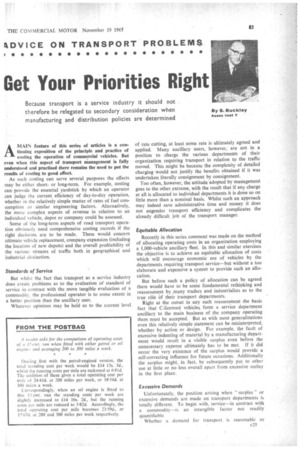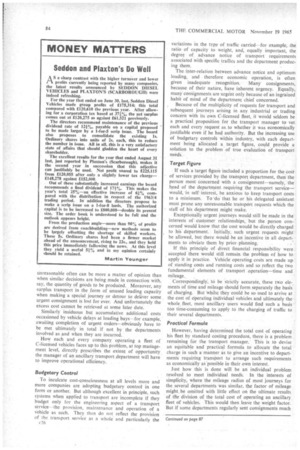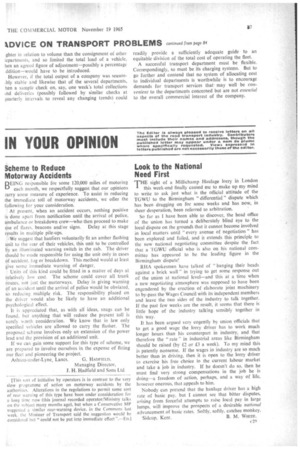Get Your Priorities Right
Page 85

Page 86

Page 89

If you've noticed an error in this article please click here to report it so we can fix it.
Because transport is a service industry it should not therefore be relegated to secondary consideration when manufacturing and distribution policies are determined AMAIN feature of this series of articles is a continuing exposition of the principle and practice of costing the operation of commercial vehicles. But even when this aspect of transport Management is fully understood and practised there remains the need to put the results of costing to good effect.
As such costing can serve several purposes the effects may be either shortor long-term. For example, costing can provide the essential yardstick by which an operator can judge the current efficiency of day-to-day operation, whether in the relatively simple matter of rates of fuel consumption or similar engineering factors. Alternatively, the more complex aspects of revenue in relation to an individual vehicle, depot or company could be. assessed.
Some of the long-term aspects of road transport operation obviously need comprehensive costing records if the right decisions are to be made. These would concern ultimate vehicle replacement, company expansion (including the location of new depots) and the overall profitability of the various streams of traffic both in geographical and industrial distinction.
Standards of Service
But whilst the fact that transport as a service industry does create problems as to the evaluation of standard of service in contrast with the more tangible evaluation of a commodity. the professional operator is to some extent in a better position than the ancillary user.
Whatever opinions may be held as to the current level of rate cutting, at least some rate is ultimately agreed and applied. Many ancillary users, however, are not in a position to charge the various departments of their organization requiring transport in relation to the traffic moved. This might be because the complexity of detailed charging would not justify the benefits obtained if it was undertaken literally consignment by consignment.
Too often, however, the attitude adoptedby management goes to the other extreme, with the result that if any charge at all is allocated to individual departments it is done so on little more than a nominal basis. Whilst such an approach may indeed save administrative time and money it does not engender transport efficiency and complicates the already difficult job of the transport manager.
Equitable Allocation Recently in this series comment was made on the method of allocating operating costs in an organization employing a 1,000-vehicle ancillary fleet. In this and similar exercises the objective is to achieve an equitable allocation of costs which will encourage economic use of vehicles by the departments requiring transport service—but without a too elaborate and expensive a system to provide such an allocation.
But before such a policy of allocation can be agreed there would have to be some fundamental rethinking and reassessment by ,many traders and industrialists as to the true role Of their transport departments.
Right at the outset in any such reassessment the basic fact that C-licensed vehicles, form a service department ancillary to the main business of the company operating them must be accepted. But as with most generalizations even this relatively simple statement can be misinterpreted, whether by action or design. For example, the fault of excessive indenting of material by a manufacturing department would result in a visible surplus even before the unnecessary expense ultimately has to be met. If it did occur the very existence of the surplus would provide a self-correcting influence for future occasions. Additionally the surplus might, in fact, be subsequently put to other use at little or no foss overall apart from excessive outlay in the first place.
Excessive Demands Unfortunately, the position arising when " surplus " or excessive demands are made on transport departments is totally different, To begin with, service—in contrast with a commodity—is an intangible factor not readily quantifiable
Whether a demand for transport is reasonable or c25 Unreasonable often can be more a matter of opinion than when similar decisions are being made. in connection with, say, the quantity of goods to be produced. Moreover, any surplus transport in the form of unused loading capacity when making a special journey or detour to deliver some urgent consignment is lost for ever. And unfortunately thefl excess cost cannot be retrieved at some later date.
Similarly insiduous but accumulative additional costs occasioned by vehicle delays at loading bays—for example," awaiting completion of urgent orders—obviously have to be met ultimately in total if not by the departments involved as and when they are incurred.
How each and every company operating a fleet of C-licensed vehicles faces up to this problem, at top management level, directly prescribes the extent of opportunity, the manager of an ancillary transport department will have to improve operational efficiency. .
Budgetary Control To inculcate cost-consciousness at all levels more and more companies are adopting budgetary control in one form or another. But although excellent in principle, such systems when applied to transport are incomplete if they budget only for the engineering aspect of a transport service--the provision, maintenance and operation of a Vehicle as such. They then do not reflect the provision of the transport service as a whole and particularly the (.26 variations in the type of traffic carried for example, the ratio of capacity to weight, and, equally important, the degree of advance notice of transport requirements associated with specific traffics and the department producing them.
The inter-relation between advance notice and optimum loading, and therefore economic operation, is often given inadequate recognition. Many consignments, because of their nature, have inherent urgency. Equally, many consignments are urgent only because of an ingrained habit of mind of the department chief concerned.
Because of the multiplicity of requests for transport and subsequent journeys arising in any industrial or trading concern with its own C-licensed fleet, it would seldom be a practical proposition for the transport manager to vet each and every request as. to whether it was economically justifiable even if he had authority. But the increasing use of budgetary controls within industry, with each department being allocated a target figure, could provide a solution to the problem of true evaluation of transport needs.
Target Figure If such a target figure included a proportion for the cost of services provided by the transport department, then the person most concerned with a consignment—namely, the head of the department requiring the transport service— would, in self interest, he anxious to keen transport costs to a minimum. To 'do that he or his delegated assistant must prune any unreasonable transport requests which the staff of his department might make.
Exceptionally urgent journeys would still be made in the interests of customer relationships, but the person concerned would know that the cost would be directly charged to his department. Initially, such urgent requests might be allowed, but there would be an incentive in all depart ments to obviate them by prior planning. .
If this principle of direct financial responsibility were accepted there would still 'remain, the problem of how to apply it in practice. Vehicle operating costs are made up of standing costs and running costs and so reflect the two fundamental elements of transport operation—time and mileage.. .
. Correspondingly, to be 'strictly accurate, these two elements of time and mileage should form separately the basis of charging. But whilst they could be so used to arrive at the cost of Operating individual vehicles and ultimately the whole, fleet, most ancillary users would find such a basis too time-consuming to apply to the charging of traffic to their several departments.
Practical Formula However, having determined the total cost of operating his fleet by standard costing procedure, there is a problem remaining for the transport manager. This is to devise an equitable and practical formula to allocate the total charge in such a manner as to give an incentive to departments requiring transport to arrange such requirements as economically as possible in their own interest.
Just how this is done will be an individual problem resolved to meet individual needs. In the interests of simplicity, where the mileage radius of most journeys for the several departments was similar, the factor of mileage might be omitted with little effect on the ultimate results of tile division of the total cost of operating an ancillary fleet of vehicles. This would then leave the weight factor. But if some departments regularly sent consignments much
ghter in relation to volume than the consignment of other iepartments, and so limited the total load of a vehicle, hen an agreed figure of adjustment—possibly a percentage ddition—would have to be introduced.
However, if the total output of a company was seasonbly stable and likewise that of the several departments, hen a sample check on, say, one week's total collections ind deliveries (possibly followed by similar checks at luarterly intervals to reveal any changing trends) could readily provide a sufficiently adequate guide to an equitable division of the total cost of operating the fleet.
A successful transport department must be flexible. Correspondingly, so must be its charging systems. But to go further and contend that no system of allocating cost to individual departments is worthwhile is to encourage demands for transport services thatmay well be convenient to the departments concerned but are not essential to the overall commercial interest of the company.
















































































































































